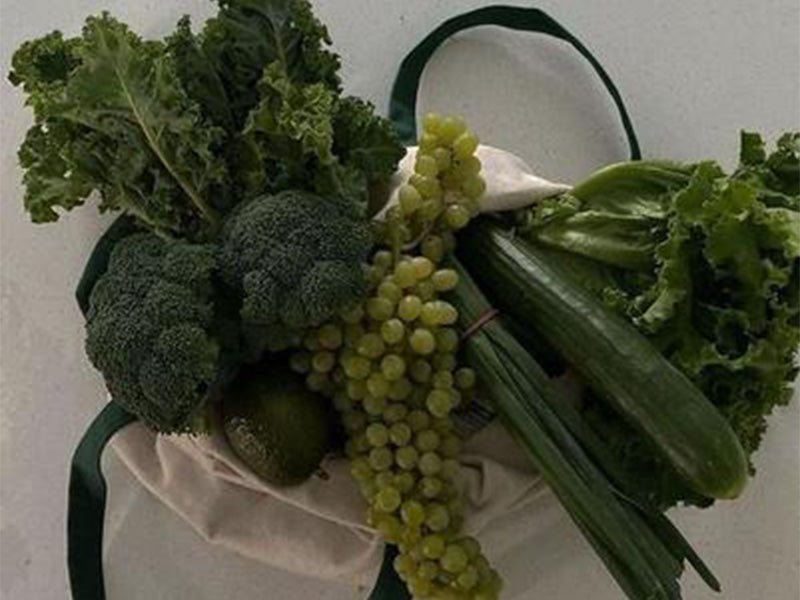How a Nutrient-Rich Diet Can Support Skin Health

The skin is the largest organ of the body, and I also believe it’s the most truthful. The state of our skin can reveal a lot about our diet, gastrointestinal microbiome, stress, hydration and even our liver.
So, what is your skin saying right now? If it’s glowing and breakout-free, it’s probably indicating that you eat well, have a perfectly functioning digestive system and manage your stress wonderfully. Or if it’s lost its glow and you see a few breakouts coming to the surface, maybe it’s time to focus on getting enough sleep, cutting down on the caffeine or alcohol and working on stress management techniques.
Building beautiful skin starts below the surface. Read on to discover which vitamins and minerals are beneficial for a glowing, breakout-free complexion.
Vitamin A
Vitamin A is an antioxidant, which helps protect against damage from UV radiation, environmental pollution, and the body’s metabolic process. Vitamin A also promotes the growth of new skin cells and regulates the skin’s sebum (oil) production.
You can find vitamin A in cod liver oil, liver, egg yolks, carrots, sweet potato, pumpkin, kale, broccoli, and spinach. Vitamin A is excellent for people wanting to bring back their glow and can help manage acne, eczema, and psoriasis in conjunction with advice from your medical professionals.
Vitamin B3
Vitamin B3, known as niacin, helps keep the skin looking soft, supple, and glowing. Essential for cell metabolism, vitamin B3 deficiencies can show up as rashes or dermatitis on the skin’s surface.2 Find vitamin B3 in green leafy vegetables, avocado, mushrooms, peas, tuna, chicken, pork, beef, and liver.
Vitamin B5
Vitamin B5, known as pantothenic acid, is what I call the anti-stress vitamin. It can help manage our stress hormone cortisol, assist with cellular growth, and aid wound healing.
Sources of vitamin B5 include broccoli, mushrooms, sweet potato, liver, kidney, fish, chicken, and egg yolks. Those who suffer from stress-induced breakouts will benefit from increasing their vitamin B5 intake3 along with practicing holistic stress management to support wellbeing.
Vitamin C
An essential for natural collagen production, which is vital for maintaining skin elasticity and strength to help reduce the appearance of fine lines and wrinkles.4 Vitamin C is an antioxidant, which means it can help protect the skin from UV damage. Find vitamin C in capsicum, citrus fruit, kiwifruit, tomato, dark leafy greens, and parsley.
Vitamin E
Vitamin E is antioxidant-rich, which helps defend the skin against oxidative stress and prevent inflammation to preserve the skin's surface5
In food, the richest sources of vitamin E are leafy greens, brussel sprouts, avocado, almonds, hazelnuts, and olive oil. Vitamin E is a fat-soluble vitamin, so make sure your diet is abundant in healthy fats, including oily fish, nuts, avocadoes, and seeds, to improve your body’s ability to absorb it efficiently.
Omega 3
Omega 3 is an essential fatty acid that supports balanced hormones and helps reduce inflammation in the body to improve skin barrier function, keeping moisture in and irritants out.6
Omega 3 is what we call an essential fatty acid because our body cannot naturally produce it, so it needs to be consumed in the diet. Find omega 3 in oily fish like salmon and mackerel, avocado, nuts, seeds, and olive oil.
Those who suffer from dry, irritated, and inflamed skin, including dermatitis, eczema, and psoriasis, will benefit from increasing their omega 3 intake.
Zinc
Zinc is a skin super healer; it’s essential in forming collagen, assisting wound healing, and improving the quality of the skin.7 Zinc regulates the function of oil-producing glands in the skin, helping remove excess sebum production to manage blemishes.
Zinc is vital for many bodily processes but, unfortunately, is lacking in most modern diets. Increase your zinc intake by consuming oysters, seafood, beans, nuts, whole grains, and pumpkin seeds. Load up on zinc if you’re prone to breakouts and inflammation.
Boost your internal vitamin intake to support overall wellbeing and health, whilst focusing on getting eight hours of sleep, keeping up hydration, and practicing stress management techniques.
Belinda Kirkpatrick is an expert Naturopath and Nutritionist with over a 17 years of clinical experience. Belinda is in clinical practice in Sydney, Australia; author of Healthy Hormones, creator of the Seed iPhone App; is a mother of two beautiful girls; loves yoga and meditation and feels like a full-time cook!
Belinda specialises in women’s and hormone health. Known best for her extensive knowledge of natural and conventional treatment in addition to her evidence-based approach to integrative healthcare.
Belinda’s tertiary qualifications include: Masters of Reproductive Health, Bachelor of Health Science (Naturopathy), Associate Degree in Clinical Sciences and Advanced Diploma of Naturopathy.
References
1Mukherjee, S., Date, A., Patravale, V., Korting, H. C., Roeder, A., & Weindl, G. (2006). Retinoids in the treatment of skin aging: an overview of clinical efficacy and safety. Clinical interventions in aging, 1(4), 327–348. https://doi.org/10.2147/ciia.2006.1.4.327
2Levin, J., & Momin, S. B. (2010). How much do we really know about our favorite cosmeceutical ingredients?. The Journal of clinical and aesthetic dermatology, 3(2), 22–41.
3Yang, M., Moclair, B., Hatcher, V., Kaminetsky, J., Mekas, M., Chapas, A., & Capodice, J. (2014). A randomized, double-blind, placebo-controlled study of a novel pantothenic Acid-based dietary supplement in subjects with mild to moderate facial acne. Dermatology and therapy, 4(1), 93–101. https://doi.org/10.1007/s13555-014-0052-3
4 Pullar, J. M., Carr, A. C., & Vissers, M. (2017). The Roles of Vitamin C in Skin Health. Nutrients, 9(8), 866. https://doi.org/10.3390/nu9080866
5Keen, M. A., & Hassan, I. (2016). Vitamin E in dermatology. Indian dermatology online journal, 7(4), 311–315. https://doi.org/10.4103/2229-5178.185494
6Kiefer, D., & Pantuso, T. (2012). Omega-3 fatty acids: An update emphasizing clinical use. Agro food industry hi-tech, 23(4), 10–13.
7Saper, R. B., & Rash, R. (2009). Zinc: an essential micronutrient. American family
- Tags: All Skin Science
